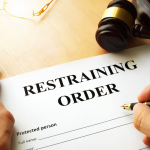How to Defend an Apprehended Violence Order (AVO) in New South Wales

Having an application for an apprehended violence order (AVO) made against you can be stressful and indeed frustrating, especially where the grounds of complaint are false or do not tell the complete story.
You’re immediately on the defensive, being put in a position where you have to attend court and explain why the AVO application is not warranted, or even truthful.
Or perhaps there’s an AVO in place which you feel should not be there – putting a mark on your reputation and potentially impeding your future prospects including your ability to gain employment, or to obtain or maintain certain licences.
But it’s important to be aware that the person who applies for the AVO bears the onus of proving it is warranted in circumstances. And while relevant ‘standard of proof’ is ‘on the balance of probabilities’ (in other words, more likely than not) rather than the higher standard of ‘beyond a reasonable doubt’ (which applies to criminal offences), the onus does not shift away from the applicant at any stage in the proceedings.
Here’s a rundown of the rules when it comes to having an apprehended violence order withdrawn, dismissed or revoked.
What is an Apprehended Violence Order (‘AVO’)?
An apprehended violence order (AVO) is a court order which is meant to protect a person from violence, threats or intimidation. Types of Apprehended Violence Orders
There are two general categories of AVOs in New South Wales:
- Apprehended Domestic Violence Orders (ADVO): which are intended to protect people from violence or threats of violence from someone with whom they have or had a domestic relationship.
- Apprehended Personal Violence Orders: which are to protect people from similar behaviour regardless of the relationship.
Who can apply for an AVO?
An AVO can be applied for by a person seeking protection, by the police on their behalf, orby both.
Under section 5 of the Crimes (Domestic and Personal Violence) Act 2007 (NSW) a person will be in a “domestic relationship” with another person if the person:
- is or has been married to the other person, or
- is or has been a de facto partner of that other person, or
- has or has had an intimate personal relationship with the other person, whether or not the intimate relationship involves or has involved a relationship of a sexual nature, or
- is living or has lived in the same household as the other person, or
- is living or has lived as a long-term resident in the same residential facility as the other person and at the same time as the other person (not being a facility that is a correctional centre within the meaning of the Crimes (Administration of Sentences) Act 1999 or a detention centre within the meaning of the Children (Detention Centres) Act 1987 ), or
- has or has had a relationship involving his or her dependence on the ongoing paid or unpaid care of the other person (subject to section 5A), or
- is or has been a relative of the other person, or
- in the case of an Aboriginal person or a Torres Strait Islander, is or has been part of the extended family or kin of the other person according to the Indigenous kinship system of the person’s culture
When an AVO or ADVO is first applied for, a court will generally grant an interim or short term AVO while the matter is being dealt with further. An interim AVO is similar to a full AVO in that it restricts your behaviour and the contact you have with the alleged person in need of protection, but it only lasts until the matter is officially decided.
If the Court makes an ADVO (including an interim ADVO) for an adult (over 16 years), this will include as a protected person under the ADVO, any child with whom that person has a domestic relationship.
Conditions placed on AVOs
The mandatory conditions of an AVO (or interim / short term AVO) are that you must not do any of the following to the protected person:
- Assault or threaten them,
- Stalk, harass or intimidate them, or
- Intentionally or recklessly destroy or damage any property that is in the possession of them or belongs to them.
However, additional orders can also be made including that you cannot approach or contact certain people, cannot enter or go near certain places, cannot own or possess firearms or other weapons etc.
Consequences of breaching AVOs
Knowingly breaching that condition by attending the home will place you at risk of being charged with the crime of contravening an AVO.
Section 14 of the Crimes (Domestic and Personal Violence) Act 2007 (NSW) prescribes a maximum penalty of two years imprisonment and/or a fine of $5,500 for contravening an order contained in an AVO.
To establish the offence, the prosecution must prove beyond reasonable doubt that:
- You contravened a prohibition or restriction specified in an Apprehended Violence Order, and
- You did so knowingly.
The section further provides that:
- Unless the court otherwise orders, you must be sentenced to a term of imprisonment if your contravention involved an act of violence,
- A court must record its reasons for not imposing a prison sentence if your contravention involved an act of violence
- The requirement of imprisonment does not apply to those under the age of 18,
- A ‘protected person’ under an AVO cannot be convicted of aiding, abetting, counselling or procuring a contravention of the AVO, and
- A police officer must make a written record of any decision not to initiate criminal proceedings.
If the officer suspects on reasonable grounds that a contravention has occurred, or if an alleged contravention has been reported to the officer.
You are not guilty of the offence if:
- In the case of an AVO made by a court:
- You were not present in court when the order was made, or
- You were not served with a copy of the order
- In the case of an AVO otherwise made, you were not served with a copy of the order,
- Your contravention was necessary to attend a mediation under section 21 of the Act,
- Your contravention was done in compliance with a property recovery order, or
- Your contravention occurred unknowingly.
Other defences to the charge include:
- Self-defence
- Duress, and
- Necessity.
Successfully defending against an AVO
It is important to be aware the person who is applying for the apprehended violence order bears the onus of proving ‘on the balance of probabilities’ that it is warranted in the circumstances.
The person against whom the order is sought bears no legal onus.
That said, there are some key tips when it comes to challenging the applicant’s attempt to have an AVO issued against you.
Challenging interim AVOs and representations for withdrawal
An interim AVO, which is one that comes before any hearing of an application for a final AVO, can be challenged in court as the process is afoot.
This will involve a relatively short court hearing.
In addition to this, there is a formal process known as ‘representations‘ for seeking to have an application for an AVO withdrawn altogether.
This process involves writing to the applicant or his or her lawyer (in the case of an AVO application made by someone other than police) and formally requesting withdrawal. The letter will set out the reasons for the request and make clear there will be an application for legal costs if the case proceeds.
The representations will be made to police in the case of an AVO application by the police. This will often be followed up by a case conference during which the reasons for the withdrawal request are put forth.
Defended hearing
In the event the representations are refused, the case will proceed to a ‘defended hearing, where a magistrate hears evidence and determines whether or not to grant the application.
There will however, be a number of court dates prior to the defended hearing, including:
- A ‘mention’, where the magistrate will ask you whether you consent to the AVO, or whether you want to defend it.
- A number of other court dates designed to serve statements upon each other and clarify evidence for the hearing.
It is important to think carefully about whether you want to consent to the AVO or not. If you do consent, the person who is seeking the AVO will be asked what orders (or conditions) of the AVO they wish to impose.
You may consent to the AVO with or without admissions. If you consent to the AVO with admissions, you will be admitting to the conduct that was alleged by the person seeking the AVO. If you consent to the AVO without admissions, you will allow the court to make the AVO, however you will not be admitting to the conduct alleged by the other person.
On the hearing date, the magistrate will read the statements and each party can give evidence and be cross-examined. Although you may represent yourself in an AVO hearing, cross-examination can be a complex and difficult task, so you should consider getting a lawyer with a proven track record of defending AVOs.
Once the magistrate has heard all the evidence, they will make an order either granting the AVO, or dismissing it. If you do not agree with the magistrate’s decision, you may appeal the matter to the District Court.
Defending against an AVO
In most situations, to finalise an AVO, the applicant (or ‘protected person’) needs to prove three things on the balance of probabilities:
- That the protected person has reasonable grounds to fear that the other person will stalk or intimidate them, or commit a ‘violence offence’ against them
- The fear is reasonable in the circumstances
- The conduct that is feared justifies the issuance of an AVO
However, in certain situations, it is not necessary to prove the first criteria (that the protected person has reasonable grounds to believe that the other person will stalk or intimidate them, or commit a ‘violence offence’ against them). Generally, this condition will not need to be proved where the protect person is:
- A child under the age of 16
- A person with below average intelligence
- Someone who has been subjected to ‘personal violence’ (i.e. domestic violence) that is likely to recur, and the order is necessary to prevent the recurrence
If the applicant is unable to prove the necessary criteria on the balance of probabilities, the court will not grant an AVO. A good lawyer will therefore attempt to present evidence to the court that will preclude any of the above criteria from being made out.
This could include presenting evidence that:
- The applicant does not fear the other person.
- There are no reasonable grounds for the application.
- The feared conduct is not serious enough to justify making an AVO.
Along with above, there are some formal defences that could be raised in order to get an AVO dismissed, including self-defence or that the applicant is making the application because they are under duress or pressure by a third party.
Getting an AVO withdrawn
If an AVO has been granted against you there are a number of circumstances in which it may be withdrawn.
These include: where the protected person requests the AVO be withdrawn, where the defendant successfully challenges the AVO or after the AVO expires.
Protected person withdrawing an AVO
If a protected person has applied for the AVO themselves, they can request to have an AVO withdrawn if circumstances have changed.
If the AVO is a final AVO either issued by consent of the parties or after a hearing, then the protected person will need to file a fresh application to the court for the revocation of the order.
If the protected person is applying to have the order withdrawn, the court will need to be shown evidence of the change in the nature of your relationship and the reasons why the person no longer fears for their safety.
If the AVO has been taken out by police, they will be the ultimate decision makers as whether to withdraw an AVO, however a protected person may make a request that it be withdrawn.
Defendant applying to withdraw an AVO or vary the condition
A defendant can also apply to vary the conditions of the AVO, or have it withdrawn. The court will consider varying the AVO or revoking it entirely if the respondent provides strong reasons why it should do so.
Varying the condition of the AVO may be granted if it shown that conditions are having unintended consequences or causing unnecessary hardship.
Withdrawing an AVO entirely is unlikely to occur unless respondent has the consent of the protected person.
The expiration of an AVO period
Generally, AVOs have an expiry date of 12 months, or a date set by the court. Once this time has passed, the AVO is no longer in force.
It’s important to note that even if an AVO has expired, it remains on a defendant’s police record, although it will not show up on a criminal records check.
Going to court over an AVO?
If you are you going to court to contest an AVO, call Sydney Criminal Lawyers anytime on 9261 8881 to arrange a free first conference during which one of our experienced defence lawyers will assess the case, advise you of your options and the best way forward, and fight for the optimal outcome.






